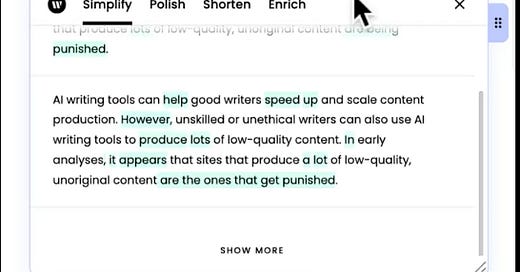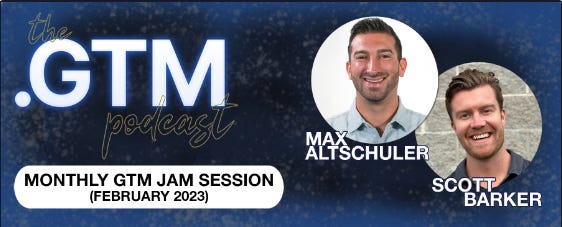The great shuffle continues.
Recently we’ve been getting a lot of leaders asking us how they should be evaluating their next opportunity in this market.
To me, it’s a lot like venture investing.
However instead of investing capital and betting on strong growth/returns, you’re investing your time and betting your financial future.
Time = Money.

So this week, we asked some of the best GTM operators in our network how they personally evaluate companies that they are thinking about joining.
Let’s get into it.
How To Evaluate Your Next Career Move in Tech
Let’s start with the basics:
What’s your current ARR?
Burn rate?
How much runway do you have?
YoY growth rate? MoM growth rate?
Daily active users? Monthly active users?
What is your projected growth rate this year?
What’s your ACV?
What’s the average length of your deal cycle?
How is your churn?
Who are your strongest logos?
How are you acquiring new customers today?
What’s your customer acquisition cost?
What’s your gross margin?
What’s your total addressable market?
Why are you the one to solve this problem? And why now?
*To me, these are all table stakes, and should give you a decent indication of the overall health of the business (we’ll dive more into these below)*
Now that you have a sense if you should even continue the conversation, let’s layer on some further context.
Andy Mowat, CEO of Gated shared his “user manual” below. I think it’s a fantastic concept that more leaders should create for themselves and those around them.
Here are Andy’s “must-haves”:
Top of funnel - I can fix problems later in pipeline but if there isn’t top-of-funnel, its hard. When I joined Culture Amp the TOFU was overflowing which made everything else easy
NPS - If folks love the product everything else will work (expansion, retention). I got the NPS reports weekly for 4 weeks before starting at Culture Amp
Who am I working with/for? Can they articulate their style and work well with mine. I use user manualS as a great litmus test. Will they read mine and will they write one (if they don’t have theirs)? Effectively I want to learn if they are a good communicator and will we work well together.
📈 How to take action/learnings:
Make sure the company has strong TOFU and NPS score, those two combined, make it easier to fix other problems across the business.
Create a user manual (example above) and encourage those you’ll be working with/for to do the same.
Scott Giffis, Investor, Advisor and Board Member (former President and COO at Frame.io) shares the same philosophy as me and likes to put his investor hat on.
“Except instead of OPM (Other People’s Money), it’s my time which has a higher bar, so it need to be a combo of opportunity and personal satisfaction.”
Here are the main things he looks for:
TAM — You can't fix TAM, though there are situations where you can create it by enabling it with new technology. When I was evaluating Frame.io for example, many of the investors that passed on Frame in the earlier days didn't see the TAM for what it was... I saw Frame as way of creating it in the same way Invision and Figma "created" the web and product design markets. If the TAM is there and you can actually serve an important part of it with the product you have today, you're going to be okay. If the TAM isn't there, you're fucked. This connects the second part of TAM for me which is "Who do you serve?" — I've found that I'm a deeply mission driven person, I have to care about the customer, the end user of the technology, if I'm going to be all in and get personal satisfaction from the work.
Product — It's less about do I connect personally to the product and more about do I believe the product delivers real value for its customers. I respect what Andy said above about TOFU but great products can still struggle to communicate their value, it doesn't mean you can't fix it. What matters most is that the product can deliver on its promise in ways that are clear and easy to understand for the end users. This connects to the personal satisfaction again, because if I care about the customer and the product does something to improve their lives and help them prosper — well that inspires me.
Value Creation — Is the company underwater with the ridiculous valuations that exist in the market? Or is there a reasonable threshold where if I create value, I will be rewarded. If you have not enjoyed an event, you may over solve for cash comp over equity value — but if you want to change your life and create real financial independence, you better understand the equity play and how the value you create will create value for you.
🧩 The other pieces of the puzzle for Scott are fairly straight-forward but still equally as important:
People — Are these people I want to spend the majority of my time with? If that chemistry is not there, walk away... and chemistry isn't just that you can share a laugh... its that they challenge you in positive ways.
Growth — Am I going to be challenged? Am I going to learn? When we stop growing, we start falling behind.
Mission and Values — Mentioned above about it but if I can't connect to the customers we serve and the value we bring them then I'm not going to have fun or feel rewarded in the ways that matter.
Contribution — I have to believe I can make an impact in a way that is rare (won't say unique) but if anyone can deliver the same value, then I walk away...
📈 How to take action/learnings:
Ask: How big is the TAM? Can I create more? Who do I serve?
Make sure you truly connect with the product.
Will I be rewarded fairly for the value I’m creating in the market?
Ask: Are these people I want to spend my life with? Am I going to be challenged? Do I align with the mission and values? Can I personally make an impact that others can’t?
A couple other unique perspectives on the topic from other successful GTM leaders below.
Rick Smolen, SVP of Sales at Loopio:
“If you only could use one lens, it's all about the quality of the CEO. The balance between employees, customers, shareholders. Their ability to build a world-class Exec team. How they have built the culture and plans to sustain it. Literally everything else builds on the back of that. I've seen multiple folks get rich but end up with PTSD based on dealing with a complete f****face CEO. Get the CEO right, and all your challenges end up being productive, actual business impact ones...the ones that matter.”
Manny Ataebi, SVP of Marketing at Eureka Security:
“I’m gonna keep it simple. If the product is something I believe can attain or has market fit in a bit market? Then I look at the leaders, the board. But in the end now, the culture for me is huge. And you can gauge that based on how the interview process goes, how much they open the kimono, and then the negotiations. All of that says a lot. Will they let me do what I think needs to be done? Will they support it? Will they be there to help? How do they speak of the existing team whether I am inheriting or replacing? Lots of other intangibles but that is a summary. The specific numbers completely depends on stage of company so it’s hard to give a full answer there.”
Adam Jarczyn, ProductLed Coach and Venture Partner at Ripple Ventures:
I use a 3 part framework:
Ideally I want to choose my leader - this person has a disproportionally high impact on my career. So if I can, i want to choose this person. Can they help me raise my standard? Learn new things? Am I a point of leverage for them in a way I want to be?
Does the company have a shared leadership philosophy as my own? a) is it safe to ask questions and be curious, b) how does the company uphold autonomy, mastery and purpose, c) how do we invest in people etc
Is this an environment I can learn in? This is broken into 3 parts: a) I can learn by doing b) I can learn by making mistakes b) I can learn by watching smart people do smart things. I look for balance across all 3 of these. Ex: there are ppl in the company who have done the thing they are doing before and have learnings/experience to demonstrate and share.
*Adam has a caveat that is definitely worth mentioning/discussing:
“Aside from my framework above, I think this topic deserves some real talk about how picky anybody can really be in this market. Yes I'd love to be able to apply the above in a search. Reality is, unless somebody has ample financial runway, the above framework doesn't apply. Sometimes it’s about weathering the storm.”
It goes without saying that not everyone has the luxury of being overly selective in this tough market. All of us have been in positions where we need to take whatever role we can get in order to pay bills and get in a position where we have enough breathing room to make more long-term strategic decisions.
👀 More for your eyeballs:
I partnered with our friends at Onboard to talk through how we’re thinking about this new “Capital+” VC model that we’re seeing emerge.
👂More for your eardrums:
Ever wonder how Gong pulled off that crazy Super Bowl Campaign? Udi ledergor, Chief Evangelist at Gong, spills the beans on this week’s GTM pod:
Double dose: we also dropped our weekly bonus episode where Max and I jam on everything we’re seeing in the venture and go-to-market landscape:
*I promise you won’t typically have to see my mug so much in this newsletter*
🚀 Start-ups to watch:
If Writer.com is not on your radar yet, it will be soon…
🔥Hottest GTM job of the week:
Account Executive at Iconic Air, more details here.
See more top GTM jobs here.
—---------------------------------
If you’re in a period of transition or evaluating your next move, I hope this gives you some food for thought.
Have a great weekend, see you all next week.
Oh and if you’re finding this newsletter valuable, please share it with a colleague or two!
Appreciate you.
Barker,
✌️









